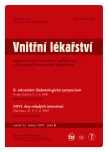-
Medical journals
- Career
Tinnitus and diabetes
Authors: M. Holcát
Authors‘ workplace: Klinika ORL l. lékařské fakulty UK a FN v Motole, Praha, přednosta prof. MUDr. Jan Betka, DrSc.
Published in: Vnitř Lék 2007; 53(5): 534-536
Category:
Overview
Tinnitus is the perception of sound in the absence of corresponding external sound(s). Tinnitus can be perceived in one or both ears or in the head. It is usually described as an unpleasant noise, but in some patients it takes the form of a ringing, buzzing, hissing, humming, or whistling sound, or as ticking, clicking, roaring, tunes, songs, or beeping. It is estimated that 1 out of every 5 people experience some degree of tinnitus. Tinnitus is not itself a disease but an unwelcome symptom. It can be accompanied by audiometric evidence of deafness which occurs in association with both conductive and sensorineural hearing loss resulting from a range of underlying causes, including ear infections, foreign objects or wax in the ear, and injury from loud noises. Tinnitus is also a side-effect of some metabolic disorders, medications, and may also result from an abnormally low level of serotonin or high level of insulin. As mentioned above, some foods are found by some people to make their tinnitus worse. The inner ear, like the brain, is totally lacking in energy reserves. Its metabolism depends directly on the supply of oxygen and glucose from the blood supply. Alterations in glucose metabolism therefore have great potential for disturbing the workings of the inner ear. Because tinnitus is often defined as a subjective phenomenon, it is difficult to measure using objective tests. Although there is no specific cure for tinnitus, those affected can learn techniques to successfully manage their tinnitus to the point where it is no longer a problem for them.
Key words:
tinnitus – hearing loss – tinnitus diet – diabetes mellitus – hyperinsulinemia
Sources
1. Novotný M. Tinnitus (doporučené postupy pro praktické lékaře). Praha: ČLS JEP, 2001: cls.meditorial.cz/seznam-doporucenych-postupu
2. Svačina Š. Prevence diabetu. Praha: Galén 2003.
3. Valvoda M. Šelesty ušní, tinnitus atrium. Praha: Gong 1992
4. Keate B. How Sugar Metabolism Affects Tinnitus. Int Tinnitus J 2004; 10 : 1-7.
5. Zelenka J, Kozak P. Disorder in Blood Supply of the Internal Ear as Early symptom of Diabetic Angiopathy. J Laryngol Otol 1965 : 79 : 88-98.
Labels
Diabetology Endocrinology Internal medicine
Article was published inInternal Medicine

2007 Issue 5-
All articles in this issue
- Outline of the physiology and pathophysiology of the senses
- Olfaction and gustation in diabetes
- Diabetes mellitus and cognitive impairments
- Examination of tactile disorders in diabetic patients and cooperation with a neurologist
- Diabetic ophthalmopathy
- Pathogenesis of diabetic retinopathy
- Cataracts, glaucoma and diabetes mellitus
- Surgical treatment of diabetic retinopathy
- Pharmacological treatment of diabetic retinopathy
- Inflammatory diseases of the eye
- Thyroid orbitopathy and diabetes
- Sensorineural hearing loss in diabetes. Prosthetic care in hearing impaired patients
- Tinnitus and diabetes
- Development of opinions on physical exercise for diabetics
- Exercise therapy for patients with metabolic syndrome
- Metabolic importance of muscles and the role of sports in diabetic patients
- Nutrition for diabetics in relation to physical exertion
- Therapeutic regimes accompanying physical exercise for diabetics
- Increased activity of the sympathetic nervous system and the possibilities for therapeutic influence
- Defining the level of physical activity for a diabetic who is obese
- Physical activity centre VŠTJ MEDICINA Prague – rehabilitation for diabetics
- Rehabilitation and prosthetic care for diabetic patients after the extremity amputation
- Editorial
- Internal Medicine
- Journal archive
- Current issue
- Online only
- About the journal
Most read in this issue- Inflammatory diseases of the eye
- Tinnitus and diabetes
- Increased activity of the sympathetic nervous system and the possibilities for therapeutic influence
- Olfaction and gustation in diabetes
Login#ADS_BOTTOM_SCRIPTS#Forgotten passwordEnter the email address that you registered with. We will send you instructions on how to set a new password.
- Career

